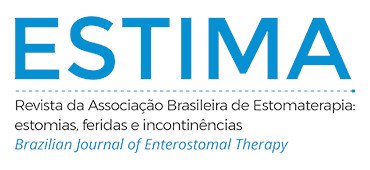Development of an interactive game for the evaluation, prevention, and treatment of incontinence-associated dermatitis
Abstract
Objective: To develop and validate an educational game for the assessment, prevention, and treatment of IAD. Method: The game "IAD – Incontinence-Associated Dermatitis" is an applied research study with technological production. The process followed three stages: analysis, design, and validation. In the analysis phase, an integrative literature review was conducted to support the game's development, identifying assessment, prevention, and treatment measures for IAD. During the design phase, planning and construction of the didactic content were carried out, including topic selection, text development for each screen, media selection, and interface layout design. The validation phase involved 44 experts, using the Delphi technique and the Content Validity Index (CVI), ensuring a validated educational resource for clinical practice. Results: In the initial assessment, most evaluators rated the game from inadequate to fully adequate, with a CVI ranging from 86.36 to 95.45%. After incorporating improvement suggestions, the game was reassessed and rated between adequate and fully adequate, achieving a CVI of 99.99 to 100.00%. Conclusion: The game "IAD – Incontinence-Associated Dermatitis" was developed as an educational tool based on scientific evidence for the assessment, prevention, and treatment of IAD, with the potential to contribute to clinical practice.
Downloads
Metrics
References
Alcoforado CLGC, Lopes FO, Fernandes RA, Carvalho RLR, Guillen MRS, Ercole FF, et al. Knowledge of nursing professionals about dermatitis associated with incontinence and pressure injury. REME Rev Min Enferm. 2019;23:e-1166. https://doi.org/10.5935/1415-2762.20190014
Sokem JAS, Bergamaschi FPR, Watanabe EAMT. Ensino sobre dermatite associada à incontinência subsidiado pela metodologia da problematização. Rev Enferm UERJ. 2019;27:e43727. https://doi.org/10.12957/reuerj.2019.43727
Salomé GM, Rocha CA. Aplicativo móvel para avaliação, prevenção e tratamento da dermatite associada à incontinência. Rev Enferm Contemp. 2021;10(1):8-16. https://doi.org/10.17267/2317-3378rec.v10i1.2963
Ferreira M, Abbade L, Bocchi SCM, Miot HA, Boas PV, Guimaraes HQCP. Incontinence-associated dermatitis in elderly patients: prevalence and risk factors. Rev Bras Enferm. 2020;73(Suppl 3):e20180475. https://doi.org/10.1590/0034-7167-2018-0475
Banharak S, Panpanit L, Subindee S, Narongsanoi P, Sanun-Aur P, Kulwong W, et al. Prevention and care for incontinence-associated dermatitis among older adults: a systematic review. J Multidiscip Healthc. 2021;14:2983-3004. https://doi.org/10.2147/JMDH.S329672
Rezende VM, Marin HF. Educação em informática em saúde: competências para os profissionais da atenção primária à saúde. J Health Inform. 2020;12(4):118-24.
Salomé GM, Rosa GCM, Rosa JI. Validação do aplicativo móvel AspTraqueal para aspiração. Rev Enferm Contemp. 2022;11:e3982. https://doi.org/10.17267/2317-3378rec.2022.e3982
Castro KS, Batista Neto JBS, Ferreira MP, Moreira NFA, Silva LCM, Castro TMG, et al. O ensino da anatomia humana através de metodologias ativas de aprendizagem: um relato de experiência. REAS. 2021;13(2):e6176. https://doi.org/10.25248/reas.e6176.2021
Machado M, Alves IS, Maia ERRM, Magalhães AAS, Cordeiro IB. Elaboração de um jogo didático de biofísica como ferramenta de aprendizado e motivação para acadêmicos do curso de medicina. Rev Bras Ensino Fís. 2021;43:e20210101. https://doi.org/10.1590/1806-9126-RBEF-2021-0101
Robles MTA, Collado-Mateo D, Fernández-Espínola C, Viera EC, Fuentes-Guerra FJG. Effects of teaching games on decision making and skill execution: a systematic review and meta-analysis. Int J Environ Res Public Health. 2020;17(2):505. https://doi.org/10.3390/ijerph17020505
Amir LR, Leonardy IC, Dewatmoko SN, Yanuar R, Suniarti DF, Idrus E, et al. Serious game as oral histology learning strategy for undergraduate dental students; crossover randomized controlled trial. BMC Oral Health. 2023;23(1):585. https://doi.org/10.1186/s12903-023-03286-3
Aperibense PGGS, Xavier BTUS, Ribeiro RL, Masson VA, Carvalho Filho MA. Design instrucional: estratégia de aprendizagem aplicada à história da enfermagem no ensino remoto. Cogitare Enferm. 2022;27:e84401. https://doi.org/10.5380/ce.v27i0.84401
Maciel DMC, Merces MC, Santos AS, Silva AP, Santos CV, Castro JO, et al. Burnout e níveis de proteína c-reativa: revisão integrativa da literatura. Acta Paul Enferm. 2023;36:APE00242. https://doi.org/10.37689/acta-ape/2023AR00242
Santos CMC, Pimenta CAM, Nobre MRC. The PICO strategy for the research question construction and evidence search. Rev Latino-Am Enfermagem. 2007;15(3):508-11. https://doi.org/10.1590/S0104-11692007000300023
Brandão ACMAG, Gambin CC, Majado CA, Kunitake N, Alexandre NMC, Dantas SRPE. Adaptation of “Perineal Assessment Tool” for Brazilian culture. Estima, Braz J Enterostomal Ther. 2018;16:e0618. https://doi.org/10.30886/estima.v16.397_PT
Beeckman D, Van den Bussche K, Alves P, Arnold Long MC, Beele H, Ciprandi G, et al. Towards an international language for incontinence-associated dermatitis (IAD): design and evaluation of psychometric properties of the Ghent Global IAD Categorization Tool (GLOBIAD) in 30 countries. Br J Dermatol. 2018;178(6):1331-40. https://doi.org/10.1111/bjd.16327
Salomé GM, Rocha CA, Miranda FD, Alves JR, Dutra RAA, Tenório AG. Algoritmos para prevenção e tratamento de dermatite associada à incontinência. Estima, Braz J Enterostomal Ther. 2020;18:e1320. https://doi.org/10.30886/estima.v18.837_PT
Chen Y, Gao Y, Zhang J, Niu M, Liu X, Zhang Y, et al. Quality and clinical applicability of recommendations for incontinence-associated dermatitis: a systematic review of guidelines and consensus statements. J Clin Nurs. 2023;32(11-12):2371-82. https://doi.org/10.1111/jocn.16306
Glass Jr GF, Goh CCK, Cheong RQ, Ong ZL, Khong PCB, Chan EY. Effectiveness of skin cleanser and protectant regimen on incontinence-associated dermatitis outcomes in acute care patients: a cluster randomised trial. Int Wound J. 2021;18(6):862-73. https://doi.org/10.1111/iwj.13588
Gunasegaran N, Ang SY, Ng YZ, Lee NES, Agus N, Lee CW, et al. The effectiveness of a hydrocolloid crusting method versus standard care in the treatment of incontinence-associated dermatitis among adult patients in an acute care setting: a randomised controlled trial. J Tissue Viability. 2023;32(2):171-8. https://doi.org/10.1016/j.jtv.2023.01.007
Wang J, Ma L, Zhou D, Yu B. Meta-analysis investigating the efficacy of liquid dressing and ostomy powder for the treatment of incontinence-associated dermatitis. Adv Skin Wound Care. 2023;36(9):481-5. https://doi.org/10.1097/ASW.000000000000001
Marques JBV, Freita D. Método Delphi: caracterização e potencialidades na pesquisa em educação. Pro-Posições. 2018;29(2):389-415. https://doi.org/10.1590/1980-6248-2015-0140
Alexandre NMC, Coluci MZO. Content validity in the development and adaptation processes of measurement instruments. Cien Saude Colet. 2011;16(7):3061-8. https://doi.org/10.1590/s1413-81232011000800006
Salomé GM. A booklet on the assessment, prevention and treatment of incontinence-associated dermatitis. Adv Skin Wound Care. 2023;36(7):355-60. https://doi.org/10.1097/01.ASW.0000926624.17117.0f
Ribeiro K, Silva EJO, Souza Filho RP, Cerqueira TV, Siqueira EG, Souza DMST. Educação em saúde sobre pé diabético: jogo educativo. Revista Sociedade Científica.2024;7(1):136-67. doi: https://doi.org/10.61411/rsc202410117
Downloads
Published
How to Cite
Issue
Section
License
Copyright (c) 2025 Geraldo Magela Salomé, Jéssica de Aquino Pereira, Catherinne Souza da Cruz Duarte

This work is licensed under a Creative Commons Attribution 4.0 International License.

























